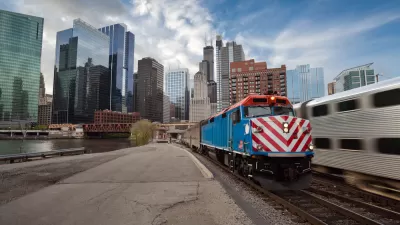Alstom Transport uses technology similar to that of hydrogen fuel cell automobiles. Railway Gazette reports that German rail authorities hope to develop Zero Emission Trains by purchasing fuel cell trainsets.
One reason for applying fuel cell technology to trains is Germany's strong interest in reducing greenhouse gas emissions from the transportation sector. The federal government "will provide financial assistance as part of its grant funding for sustainable transport projects," according to Railway Gazette.
"The only emissions from fuel cells are heat and water," one of the major benefits of hydrogen powered vehicles, according to "How Stuff Works."
"Alstom Transport hopes to have 40 fuel cell-powered regional trains in commercial service on regional lines in Germany by 2020," they write. Four railway authorities have signed letters of intent with Alstom
The powertrain will use hydrogen fuel cells, batteries and energy storage systems to replace a roof-mounted diesel powerpack, giving equivalent performance to an electric multiple-unit [EMU].
"Alstom claims the trains would be ‘completely emission free’, noting that even electric trains can have a carbon footprint based on the fuel used for power generation," according to Railway Gazette. However, hydrogen also has a carbon footprint based from how it is produced. See "Box 1: Hydrogen Production Pathways" in "Hydrogen fuel cell vehicles" the Center for Climate and Energy Solutions.
[Hat tip to Eugene Wilson of Sierra Club Chapter Transportation Chairs Forum.]
FULL STORY: Fuel cells to power regional trainsets

Planetizen Federal Action Tracker
A weekly monitor of how Trump’s orders and actions are impacting planners and planning in America.

Chicago’s Ghost Rails
Just beneath the surface of the modern city lie the remnants of its expansive early 20th-century streetcar system.

San Antonio and Austin are Fusing Into one Massive Megaregion
The region spanning the two central Texas cities is growing fast, posing challenges for local infrastructure and water supplies.

Since Zion's Shuttles Went Electric “The Smog is Gone”
Visitors to Zion National Park can enjoy the canyon via the nation’s first fully electric park shuttle system.

Trump Distributing DOT Safety Funds at 1/10 Rate of Biden
Funds for Safe Streets and other transportation safety and equity programs are being held up by administrative reviews and conflicts with the Trump administration’s priorities.

German Cities Subsidize Taxis for Women Amid Wave of Violence
Free or low-cost taxi rides can help women navigate cities more safely, but critics say the programs don't address the root causes of violence against women.
Urban Design for Planners 1: Software Tools
This six-course series explores essential urban design concepts using open source software and equips planners with the tools they need to participate fully in the urban design process.
Planning for Universal Design
Learn the tools for implementing Universal Design in planning regulations.
planning NEXT
Appalachian Highlands Housing Partners
Mpact (founded as Rail~Volution)
City of Camden Redevelopment Agency
City of Astoria
City of Portland
City of Laramie



























